Wira-Miroslawa Szot
Kosnicha 5/15
42-200 Czestochowa Czestochowa, 28/XI.1994
Voivodeship Court in Warsaw
VIII. Criminal Enforcement Division
WARSAW
On num.act III3/48
Your Honor,
I hereby state that in the protocols during the investigation as of 1947 in Mokotów, I deliberately lied, because I realized that I was in the hands of an indirect enemy of my Homeland. In Mokotów, I encountered NKVD advisers who were also directly interested in my identity.
My case was so complicated that my cousin Tadeusz Baszczynski from Cieszyn was closed into the cell next to where I was interrogated. I recognized him by his voice, and he screamed fiercely that he was innocent and should be let go. My despair was enormous. I co-experienced our shared pain because of his love for a Cieszyn girl from the Polish Cieszyn city, he fled from the Czech Republic, from his home. The cousin married without the knowledge of his parents, arranged a family nest, waited for the birth of their son (now a professional military officer), and had not lived to see his daughter. In such a situation, under such psychological pressure, I signed protocols that I was a “member of the UPA”, and in fact only with the help of the UPA I was led across the Polish-Soviet border. I did not read the minutes, I just signed them.
I managed to hide all my occupation activities in the OUN, which I was involved in during the first weeks of July 1941. My nickname was “Triska” (lit, – “Cod”) (in Polish — trzaska (tshaska)). I worked in the town of Sudova Vyshnia. I maintained contacts with Horodok, near Lviv, with Komarno, and Mshana. Typical activities for a liaison person: dissemination of illegal press, delivery of secret messages. In addition to my work with the Ukrainian Public Aid Committee, I additionally had charity classes, such as in the attached photocopy of the document of my supervisor who lived in London.
I was young, but in order to save my friends from being sent to Germany to earn money, so that they would not get into munitions factories, we organized courses for educators. In this way, we managed to save over twenty girls. I was the organizer, I would like to boast that I have organized twenty-eight kindergartens in the territory of the Sudova Vyshnia district. These were the first kindergartens in this territory, and the town of Sudova Vyshnia included 30 surrounding villages. At that time, it was difficult but there was Mr Ivashko, an older man who knew perfectly well the German language, who was an intermediary between the Public Aid Committee and the Reichskommissariat. Thus, we received food aid from Lviv for preschoolers, for an orphanage (18 children), and for an elderly home in Sudova Vyshnia. The Polish Committee acted in a similar way.
In the Ukrainian Committee for Public Assistance in Sudova Vyshnia, I began to work as a printer, then as a secretary, and then as a head of the office. I neglected to work in the area, limiting myself to working with kindergartens.
It was 1942. Hitlerites fooled Ukrainians by promising “Independent Ukraine.” They released many prisoners of war (Ukrainian people) from prison camps in Southern Czechoslovakia. We organized assistance in the Committee, and through the trustees available in each village, we intercepted those unfortunate people who were returning to their homes.
Even then, I had to act as a nurse because those poor people were in a terrible physical and mental state. There was another doctor, Dr. Radkevych / died in the USA/. He would teach me and my sister, Iryna Makarukha, to dress the wounds, or to give the medication. My cousin caught the typhoid from them, and I developed hideous ulcers on my skin. We both were lucky to recover. Those were the early stages of the fight but the young bodies managed to overcome it all.
As to the captured soldiers, they would sometimes look like human parts. Some of them did not know who they were, they would mutter indistinctly. I managed to put them on the train to Lviv, to their homeland. As I managed to analyze it later, there were also some Polish officers who disguised and wanted to get to their families near Lviv, or even to Romania or further.
The price for the release of those prisoners was bitter, because the cunning Hitlerites demanded that all institutions and enterprises submit a list of men of conscription age. And it happened. They took up the Central Committee in Lviv regarding the “organization” of the SS “Halychyna” division. There was a terrible panic among the participants. People defended themselves in different ways. The easiest thing to do was to escape to join the underground. Single mothers and widows fell into despair.
But the solidarity was extraordinary between the three peoples inhabiting those territories. No one entered the camp as a political prisoner. It was only the tragedy of the Jewish people as a cruel vision of evil weighing over everyone.
Did I do much during the Hitler occupation? I’m not here to judge.
Your Honor!
I joined the underground on July, 18, 1944. Our group of four included my legendary husband, my friend “Zelena” and my cousin, also an OUN member who was already 23.VII. died in 1944.
During that time, I stayed in Yavoriv Poviat and was there as a nurse/student at the course conducted by Dr. Radzikiewicz. We did not finish as the front was approaching. I have not mastered intravenous injections/. I bandaged the wounds people received from the shots of the enemy, the NKVD. Those territories had been already “liberated” by the Soviet army on July, 23, 1944.
I also had cases where I needed to provide sanitary assistance to the local population, which I also did. For example, I treated the wound for a 3-year-old boy who was kicked by a horse in the right eyebrow, but the doctor could not be found within a few kilometers. Somehow, I managed it thanks to a well-organized network of wound-dressing hiding places and due the huge help from the locals. In the autumn of 1944, I was transferred to the village of Rohizno, Yavoriv Poviat. I was a printer there. On the matrix, I copied materials related to organizational issues such as about what we fight for, what we strive for. It was then disseminated among people and the effect was great. The impact was expressed during the elections to the Verkhovna Rada on June, 16, 1946.
I hereby quote the verified indisputable fact that in the struggle for Democratic Ukraine, we won the elections on June, 16, 1946, and not only in the District covered by the OUN that during the Nazi occupation was joined by various legal and political Ukrainian groups since the times of Poland before the occupation in September. Only a few percent of the population voted for the Communists. The data corresponds to the minutes that I drafted and which were then sent by couriers abroad. Now I know that our Archive is in Canada and those materials should be there. I assume that they were used in the diplomatic work of the Ukrainian diaspora.
I also hereby claim that after I was arrested during the amnesty in 1945, and released, I did not do any work for the NKVD. The pre-election period was approaching to the Verkhovna Rada of the USSR. I was trusted by members of the OUN organization, otherwise I wouldn’t have done as much in the printer’s role.
The elections of June, 16, 1946 in the district covered by the Organization were falsified by the Communist election commissions. Before closing of the ballot boxes, they were overwhelmed by panic. They threw in as many ballots as they needed to have it come out their way. We had our own “people” in each election commission and we had reliable data from them.
After the election, I appealed to the OUN District Organization, to a friend of the deceased “Holovach”, to allow me to cross the Polish-Soviet border in order to reach my family in Czechoslovakia. In my opinion, my political work was successfully completed because we actually won those elections. I was nervously exhausted, and I might have shown the gene of some generation of the Szot family belonging to the Austrian nation, which was confirmed in my search for our roots in the Vienna Central Archives. In fact, several families of the Szots were relocated to Galicia, during the rule of Empress Maria Theresa and Emperor Joseph II, in order to spread mechanical weaving. And something more. I had an uncle, a lawyer from Jagiellonian University in Kraków, who often visited my father and said that according to the law on illegal work, it “demoralizes a person”. It has stuck in my head. The mathematical mind told me that my finish was there.
I love my country but I have no other homeland than Ukraine. Although I have learned only now that my great-grandfather was Austrian but since it was the will of one of my forefathers, I completely obey His will and I will not seek other “Gods”.
Your Honor.
When I was in high school, I was president of the school’s student committee. Our school principal was somehow dissatisfied with the fact that that position was held by a person not affiliated with the party, so he forced me to sign the Komsomol declaration. I became only a “paper-based” Komsomol member because I could not publicly renounce God. As a result, I was only underscored in physics which was taught by the school principal.
In Poland, I did not write any reports and did not do other work – I was just waiting for a document. Besides, according to my information, at that time there was already an agreement with the State Army /I do not know the exact details/ but I know that they were not supposed to interfere with each other, such as the Polish and Ukrainian underground were not supposed to stand in each other’s ways. Those are distant times, so I would not like to “be in the fog.”
While still in the forest with the “Brill” unit, they were saying they would keep in touch with Ukraine. Then I personally asked “Brill” to allow me to contact the family who lived there. Then, I also made a fundamental mistake by giving him the address of my cousin in Cieszyn, at 33 Bielska St., Bashchynskyi Tadeusz. On June, 4, 1947, Tadeusz was arrested, /”Bril” was killed in a fight in the Carpathians,/and I was arrested on June, 7, 1947.
As for the minutes, today it is difficult for me to say how much lies I included in there, and how many accusations or fantasies of that investigating officer were included. But the fact is that I withheld all of my underground activities in the occupation times because they were satisfied with my work in the Ukrainian National Committee and accused me of working for the fascists. The Hitlerites were invaders to me. Furthermore, as I mentioned in my letter to President Bierut, I was helping my Jewish friends as much as I could, and I’m skipping those details here.
During the liquidation of the entire underground in Poland in 1947, my father, Grzegorz Szot, was arrested and prosecutes in the Soviet Union, although he adhered to leftist views /did not belong to the Communist Party, in post-war Poland he was a candidate for deputy to the Seim of the Republic of Poland; the father did not have enough votes, and a Jew won the elections because in those towns, according to statistics, 1/3 of the population were Jews and Ukrainians/. He spent 6 years in prison in Drohobych and Lviv, and my mother, with my 6-year-old younger sister, and with her two sisters, 16 and 21, were taken to Siberia, seven thousand kilometers away from Poland. My only brother also spent 10 years in Kolyma. I learned it all in prison.
The detention center in Mokotów was a terrible institution for breaking human willpower, and although it has been so many years, it is impossible to peacefully think about those times. After all, the human conscience is the best judge of a normal person educated on certain ethical and moral principles.
I hereby apologize for some unintentional inaccuracies.
No one will return my health lost there. As the youngest person in the investigation team, I had to sleep on thin hay mattrasses, on cement. I have a Group II disability status, I keep struggling with rheumatic and allergic diseases.
Your Honor!
This concludes my response to the High Court’s letter of 12 October 1994 to the Office for Veteran Affairs and Victims of Reprisals about myself.
However, I am very pleased that I lived up to the Independent Ukraine and that I live in a democratic Poland, friendly to my homeland.
With all due respect
/Szot Wira /
P.S. Concerning my “legendary husband”: he was injured by his opponent. I treated him myself with wonderful propolis alone, made by local beekeepers. Shortly after the treatment, during the invasion of 20 NKVD-ists, Trytyak Bohdan, alias “Holovach”, alias “Mykytka”, did not want to give up, and he blew himself up with a grenade, previously injuring one of the opponents. The remains of his head, along with his shoes, were taken to Yavoriv district by the NKVD. He was the eldest son of the director of the Scavinski chicory plant of Frank. He graduated from the Faculty of Chemistry at the Jagiellonian University in Kraków.
Appendix.
A copy for the archive in Lviv
And ” ” in Warsaw
Оriginal
Szot Wira-Miroslawa
Kosniczna 5/15
42-200 Częstochowa Częstochowa, dnia 28/XI.1994 r.
Sąd Wojewódzki w Warszawie
VIII Wydział Karny Sekcja Wykonawcz
WARSZAWA
Dot. sygn. akt III3/48
Wysoki Sądzie.
Niniejszym podaję, że w protokółach, w czasie śledztwa, od 1947 r. na Mokotowie podawałem szereg kłamstw świadomie, ponieważ zdawałam sobie sprawę, że jestem w rękach pośredniego wroga mojej Ojczyzny. Na Mokotowie zetknęłam się z doradcami NKWD, którzy też żną bezpośrednio interesowali się.
Sprawa moja była na tyle skomplikowana, że obok celi, gdzie mnie przesłuchiwano, posadzono mego kuzyna Tadeusza Baszczyńskiego z Cieszyna. Poznałam go po glosie, a darł się niezamówione, że jest niewinny i aby go wypuszczono. Moja rozpacz była ogromna, razem z nim przeżywałam nasz ból, bo z miłości do cieszynianki z polskiego Cieszyna uciekł z czeskiego, z rodzinnego domu, od wpływów żyliśmy. Ożenił się bez wiedzy rodziców, uwił swe rodzinne gniazdko dorabiając się synka (obecnie zawodowego WP) i nie doczekał się przyjścia na świat córeczki. W takiej sytuacji, będąc pod takim psychicznym naciskiem, podpisywałam protokoły, że byłam «członkiem UPA», a faktyczne ja tylko przy pomocy UPA zostałam przeprowadzona przez granice polsko-radziecka. Nie czytało się protokołów, tylko się je podpisywało.
Udało mi się ukryć moja cała działalność okupacyjna w OUN, do której zostałam wciągnięta w pierwszym tygodniach lipca 1941 roku. Miałam pseudonim «Triskal» (po polsku trzaska). Pracowałam na terenie miasta Sudowa Wisznie. Kontakty były z: Horodok k/Lwowa, Komarno, Mszona. Działalność jak przeciętniej Łeczniczki: kolportaż nielegalnej pracy, doręczanie grypsów. Ja miałam dodatkowo z pracą w Ukraińskim Komitecie Pomocy Społecznej zajęcia charytatywne, a też jak załączonym ksero dokumencie mego szefa, zamieszkałego w Londynie.
Byłem młodziutką, ale dla ratowania moich koleżanek przed wyjazdem do Niemiec na roboty, aby nie trafiły do fabryk amunicji – zorganizowaliśmy kura dla Wychowawczyń Przedszkoli. Udało się w ten sposób uratować dwadzieścia kilka panienek. Ja byłem organizatorką i w tym miejscu pozwolę sobie pochwalić się że zorganizowałam na terenie rejonu Sudowa Wysznia dwadzieścia osim przedszkoli. To były pierwsze przedszkola na tym terenie, a należało do miasteczka Sudowej Wyszni 30 wsi. Ciężko było w te czasy ale był pan Iwaszko, staruszek, perfekt znający język niemiecki, który pośredniczył między Komitetem Pomocy Społecznej a Kreiskomisarzem. W ten sposób otrzymywaliśmy pomoc żywnościom ze Lwowa na dokarmianie dzieci w wieku przedszkolnym oraz Sierocińca (18-ro dzieci) i Dom Starców w Sudowej Wyszni. W podobny sposób działał Polski Komitet.
W Ukraińskim Komitecie Pomocy Społecznej w Sudowej Wiszni zaczęłam pracować jako maszynistką, następnie sekretarką, a później szef kancelarii. Zaniedbywałam się w pracy na terenie rejonu, ograniczając się tylko do pracy nad przedszkolami.
Był rok 1942. Hitlerowcy oszukiwali ukraińców obiecując «Samostijną Ukrainą». Wypuścili wiele jeńców (Ukraińców) z obozów jenieckich na terenie południowej Czechosłowacji. W Komitecie zorganizowaliśmy pomoc i przez Mężów, Zaufanie, którzy byli w każdej wsi – przechwytywaliśmy tych nieszczęśników, wracających do rodzinnych domów.
Musiałam już wtedy być pielęgniarką, bo ci biedacy byli w potwornym stanie fizycznym i psychicznym. A był tylko jeden lekarz dr. Radziekiewicz /zmarł w USA/. Uczył mnie i kuzynkę Irene Makaruche jakie leki im dawać, jak robić opatrunki i t.p. Moja kuzynka nabawiła się od nich tyfusu, a ja jakich obrzydliwych owrzodzeń. Wykaraskaliśmy się obie. To były prymitywne czasy walki, ale młode organizmy przezwyciężyły.
Odnośnie tych jenców – to były fragmenty ludzkie. Niektórzy nie umieli podać kim są, bełkotali niezrozumiale. A ja zarejestrowałam i do pociągu na Lwów, w rodzinne strony. Jak skojarzyłem powne fakty, to wśród nich byli też polscy oficerowie, którzy maskując się, chcieli przedostać się do rodzinnych domów za Lwowem, bądź do Rumunii i dalej.
Zapłatę za wypuszczenie tych jeńców była gorzka, bo chytrze hitlerowcy zażądali o wszystkich instytucji i przedsiębiorstw spisu mężczyzn w wieku poborowym. I stało się. Przycisnęli Centralny Komitet we Lwowie w sprawie «zorganizowania» SS Dywizji Galizien. Był straszny popłoch wśród zainteresowanych. Ludzie bronili się w różny sposób. Ucieczka w podziemie – najprostsza sprawa. Rozpacz była samotnych matek i wdów.
Ale solidarność między trzema narodami, zamieszkałymi te tereny była znakomita. Nikt nie dostał się politycznie do obozu, jedynie tragedie żydowskiego narodu, jak okrutna wizja zła ciężyła na wszystkich.
Czy dużo zrobiłam za hitlerowskiej okupacji? Ocena nie należy do mnie.
Wysoki Sądzie!
W podziemie poszłam 18 lipca 1944 r. W naszej czwórce był mój legendarny mąż, moja koleżanka «Zełena» oraz mój kuzyn, też członek OUN, który już 23.VII.44. zginął.
W tym okresie przebywałam na terenie jaworowskiego powiatu i byłam tam pielęgniarką /kurs prowadzony przez dr. Radzikiewicza nie dokończyłyśmy – front zbliżał się. Nie znałam dożylnych zastrzyków/. Opatrywałam rany postrzelonych przez przeciwnika, przez NKWD. Te tereny były już «wyzwolone» przez armię radziecką 23 lipca 1944.
Miałam też wypadki, że trzeba było udzielić sanitarnej pomocy miejscowej ludności, co też wykonywałam. Opatrzenie rany chłopczykowi 3-letnemu, którego kopnął koń w prawy łuk brwiowy, a nie było na kilometry lekarza. Jakoś mi się udało, dzięki dobrze zorganizowanej siatce opatrunkowych schówków i ogromnej pomocy ludności. Jesienie 1944. Zostałam przeniesiona do wsi Rogóźno, pow. jaworowski. Tam byłam maszynistką. Na matrycy powielałam materiały, dotyczące spraw Organizacyjnych, mianowicie: o co walczymy, do czego zmierzamy. Szlo to w teren do ludzi a skutek był wspaniały. Zaowocował, podczas wyborów do Werchownej Rady 16 czerwca 1946 r.
Podaję fakt niezbity, niezaprzeczalny, że w walce o Demokratyczną Ukrainę, wygraliśmy wybory 16.VI.46. nie tylko w Okręgu organizacji OUN, do której za hitlerowskiej okupacji weszły różne ugrupowania legalne, polityczne ukraińskie z czasów Polski dowrześniowej. Za komunistami głosowało tylko kilkanaście procent ludności. Dokładne dane, według protokołów, ja pisałam, które następnie kurierami wysyłano za granicę. Obecnie wiem, ze nasze Archiwum mieści się w Kanadzie i tam te materiały powinny być. Przypuszczam, że były wykorzystane w dyplomatycznej robocie ukraińskiej Diaspory.
Podaję też, ze po aresztowaniu mnie podczas amnestii w 1945 r. i wypuszczeniu mnie na wolność, żadnej roboty na korzyść NKWD nie robiłam. Zbliżał się okres przedwyborczy do Werchownej Rady ZSRR. Członkowie Organizacji OUN mieli do mnie zaufanie, inaczej nie zrobiłabym tyle jako maszynistką.
Wybory 16. czerwca 1946 r. na terenie Okregu Organizacji nam podległego zostały przez komunistyczne Komisje Wyborcze s f a ł s z o w a n e . Paniczy strach ich ogarnął, przed zamknięciem urn wyborczych. Powrzucali kartek tyle, aby wyszli na swoim. W każdej komisji mieliśmy swoje «wtyczki» i od nich mieliśmy wiarygodne materiały.
Po wyborach, poprosiłam Okręgowego Organizacji OUN, znajomego zmarłego «Holowacza» o umożliwienie mi przejścia granicy polsko-radzieckiej w celu dostania się do rodziny w Czechosłowacji. Według mego pomyślunku, moja robota polityczna zakończona z pozytywnym rezultatem, bo faktycznie wygraliśmy te wybory. Byłam wyczerpana nerwowo i może w tym wypadku odezwał się we mnie gen któregoś tam pokolenia przynależności rodziny Szotów do austriackiego narodu, co zostało potwierdzone w moich poszukiwaniach naszych korzeni w Centralnym Archiwuwe Wiedniu. Faktycznie kilka rodzin Szotów wysiedlono za cesarzowej Marii Teresy i cesarza Josefa II do Galicji, w celu poszerzania mechanicznego tkactwa. I nie tylko to. Miałam stryja prawnika z UJ w Krakowie, który często odwiedzał mego ojca i zgodnie z prawem wywodu prowadził na temat nielegalnej roboty: że ona «deprawuje człowieka». To mi bardzo utkwiło w głowie. A matematyczny umysł dyktował, że finisz mój nadszedł.
Kocham swój Kraj, nie mam innej Ojczyzny poza Ukrainą, chociaż dopiero teraz dowiedziałam się, że pra-pra był austryjakiem, ale skoro taka wola była któregoś z praprzodków – to w całej rozciągłości podporządkowuję się Jego woli i nie będę szukać innych «Bogów».
Wysoki Sądzie.
Będąc w średniej szkole, byłam przewodniczącą Uczniowskiego Komitetu tejże szkoły. Jakoś to nie pasowało naszemu dyrektorowi, aby bezpartyjna była na tym stanowisku, więc wymógł na mnie podpisanie komsomolskiej deklaracji. Zostałam tylko «papierową» komsomołką, z, ponieważ nie byłam zdolna publicznie wyrzekać się Boga. Pozostało tylko na obniżeniu stopni z fizyki, która wykładał tenże dyrektor.
Na terenie Polski nie pisałam żadnych sprawozdań, ani nie przejawiałam żadnej innej roboty, po prostu czekałam na dokument, który według me rozeznania, w tym okresie już było porozumienie z AK /dokładnie szczegółów nie znam/, wiem że nie mieli sobie przeszkadzać, podziemie polskie ukraińskiemu i odwrotnie. To są odlegle czasy, więc nie chciałabym «bujać w obłokach».
Jeszcze będąc w lisie, z oddziałem «Bryla», mówiono o tym, że będą utrzymywać kontakt z Ukrainą. Wówczas osobiście poprosiłam «Bryla», aby mi umożliwił korespondencyjny kontakt z rodziną tam zamieszkała. Wówczas też zrobiłam kardynalny błąd, dając mu adres mego kuzyna w Cieszynie ul. Bielska 33 Baszczyński Tadeusz. 4.VI.47 r. aresztowano Tadeusza, / «Bryl» zginał w potyczce w Karpatach»/ a ja zostałam aresztowana – 7.VI.47 r.
Odnośnie protokołów, to trudno dziś mi powiedzieć ale było moich kłamstw a ile domniemań, czy fantazji danego oficera śledczego. Fakt, że ukryłam cala okupacyjną podziemną moją działalność, bo zadowolili się moją pracą w Nacjonalnym Ukraińskim Komitecie i obciążyli mnie w tymże faszystowską robotą. Hitlerowiec był n a j e ź d ź c ą dla mnie. A jak już wspomniałam w piśmie do Prezydenta Bieruta, jak mogłam, tak pomagałam koleżankom żydówkom, pomijam tutaj te szczegóły.
W czasie likwidacji wszelkiego podziemia w Polsce w latach 1947, na terenie Związku Radzieckiego aresztowano i sądzono mego ojca Szota Grzegorza, mimo że był lewicowcem /nie należał do partii komunistycznej, w dowojennej Polsce był kandydatem na Sejm Polskiej Rzeczpospolitej, zabrakło ojcu niewielka ilość głosów, a przeszedł ktoś z żydów, bo w tych małych miasteczkach, to było według statystyki po 1/3 ludności żydów i ukraińców/. Siedział 6 lat w Drohobyczu i we Lwowie, a matka z najmłodszą siostrą, 6-cio letnią i dwoma siostrami 16 lat i 21 lat wywieziona na Sybir, siedem tysięcy km. od Polski. Na Kołymie był też jedyny brat przez 10 lat. O tym wszystkim dowiedziałam się we więzieniu.
Więzienie śledcze na Mokotowie, to potworna instytucja od łamania ludzkich charakterów i chociaż tyle lat minęło, nie sposób spokojnie o tych czasach myśleć. A ludzkie sumienie jest najlepszym sędzią u normalnego człowieka, wychowanego w pewnych zasadach etyczno-moralnych.
Ze nieświadome uchybienia, tą drogą przepraszam.
Nikt mi nie zwróci zdrowia, które tam straciłam. Jako najmłodsza, w grupie śledczej, musiałam spać na cieniutkim sienniczku, na cemencie. Jestem inwalidą II-giej grupy i stale leczę schorzenia reumatyczne, alergiczne.
Wysoki Sądzie!
Na tym kończę moją odpowiedz na pismo W. Sądu z 12.X.94. do Urzędu dO Spraw Kombatantów i Osób Represjonowanych, dotyczącego mojej osoby.
Jedna mam ogromna satysfakcję, że doczekałam się Niezależnej Ukrainy i że żyje w Polsce Demokratycznej, przyjaznej mojej Ojczyźnie.
Z należnym szacunkiem
/ S z o t Wira/
P.S. Odnośnie mego «legendarnego męża»: został ranny przez przeciwnika. Z rany wyleczam go sama, wspaniały i jedyny był propolis, robiony przez miejscowych pasieczników. W krótkim czasie, po wyleczeniu, podczas najazdu 20-tki NKWD-stów Trytiak Bohdan ps. «Hołowacz» ps. «Mykytka», nie chcąc się poddać, rozerwał się granatem, uprzednio raniąc jednego w przeciwników. Szczątki jego głowy NKWD-ści, wraz z jego butami powieźli do rejonu Jaworów. Był najstarszym synem dyrektora Skawińskich Zakładów cykorii Franka. Sam skończył chemię na Uniwersytecie Jagiellońskim w Krakowie.
I załącznik.
I egz. dla Archiwum we Lwowie
I « « « w Warszawie

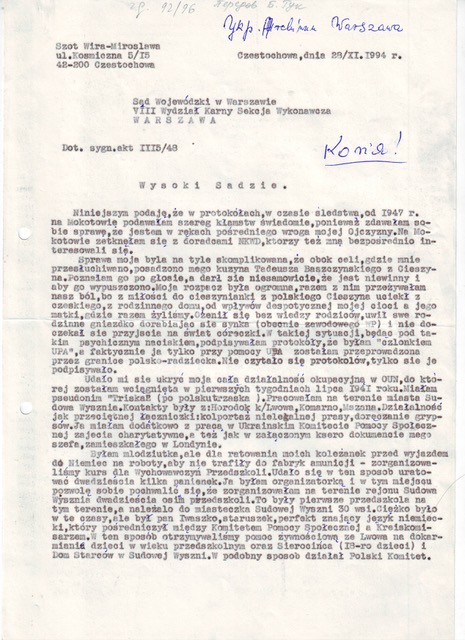
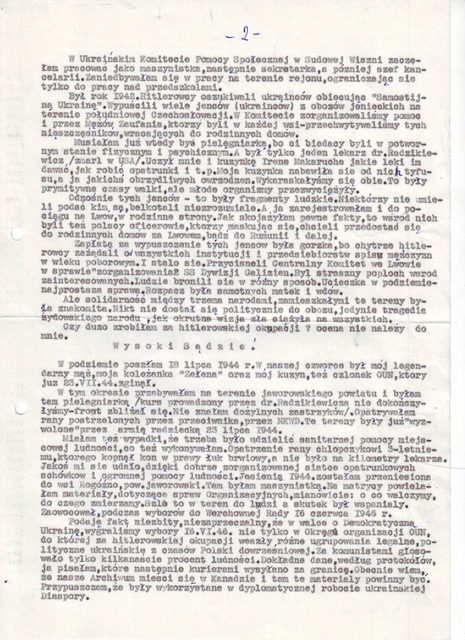
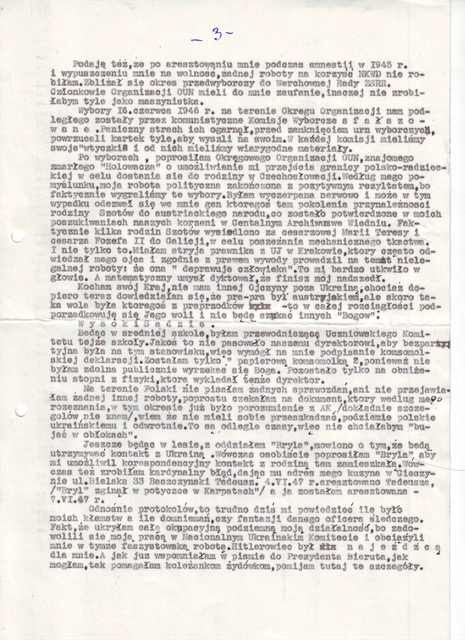
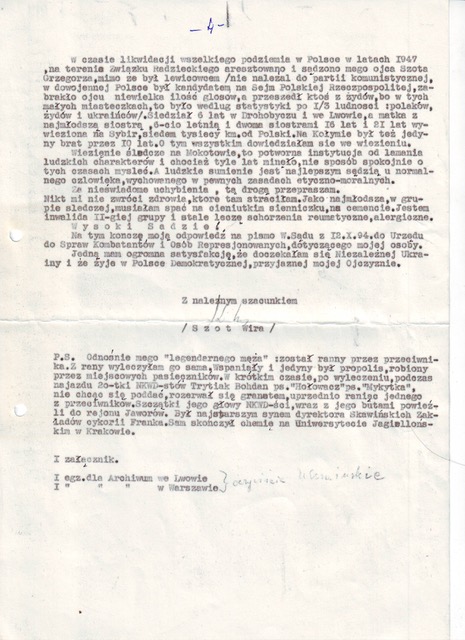
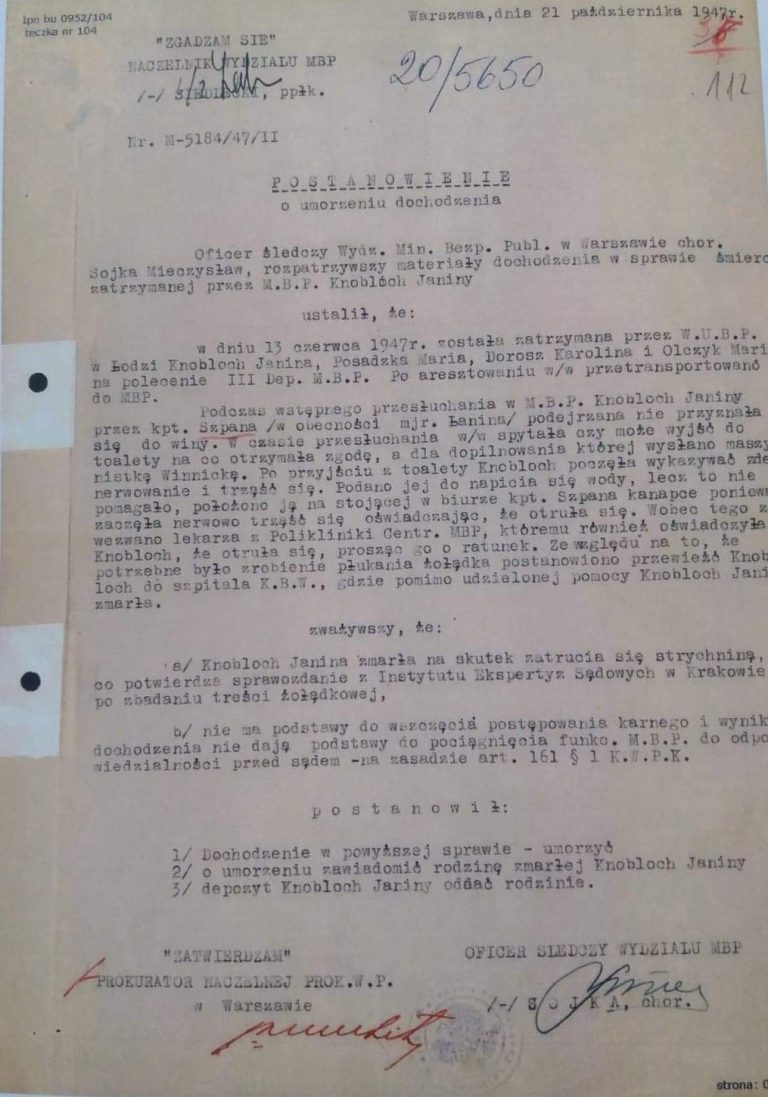
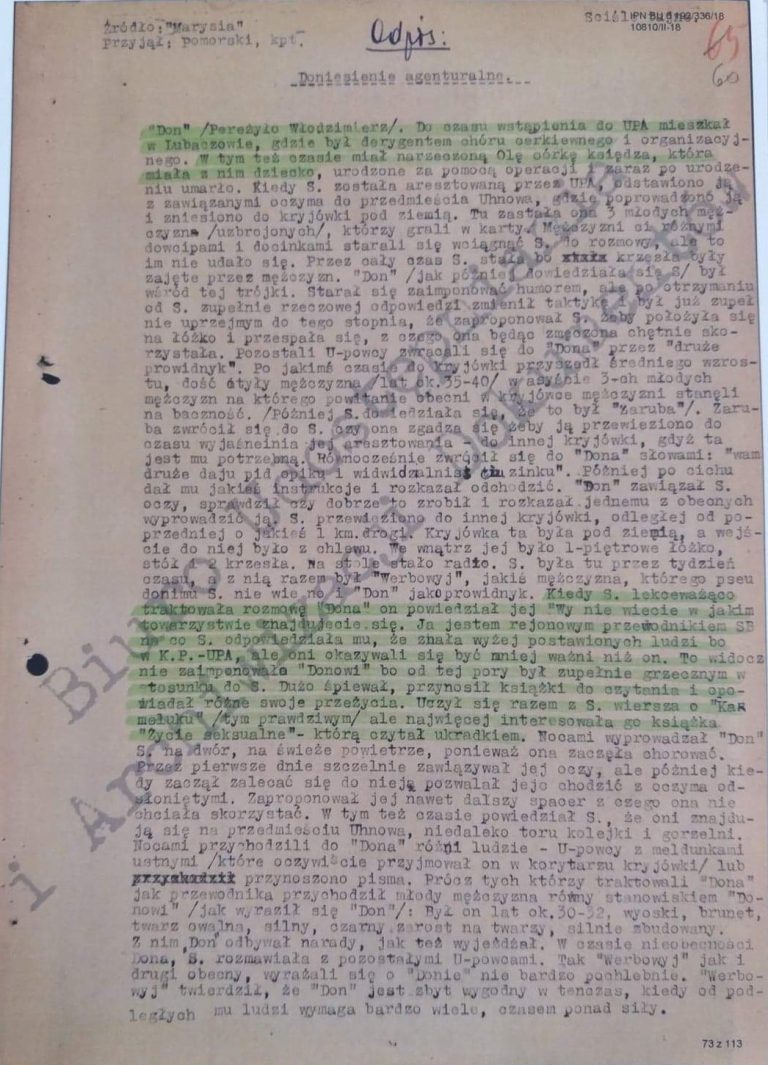
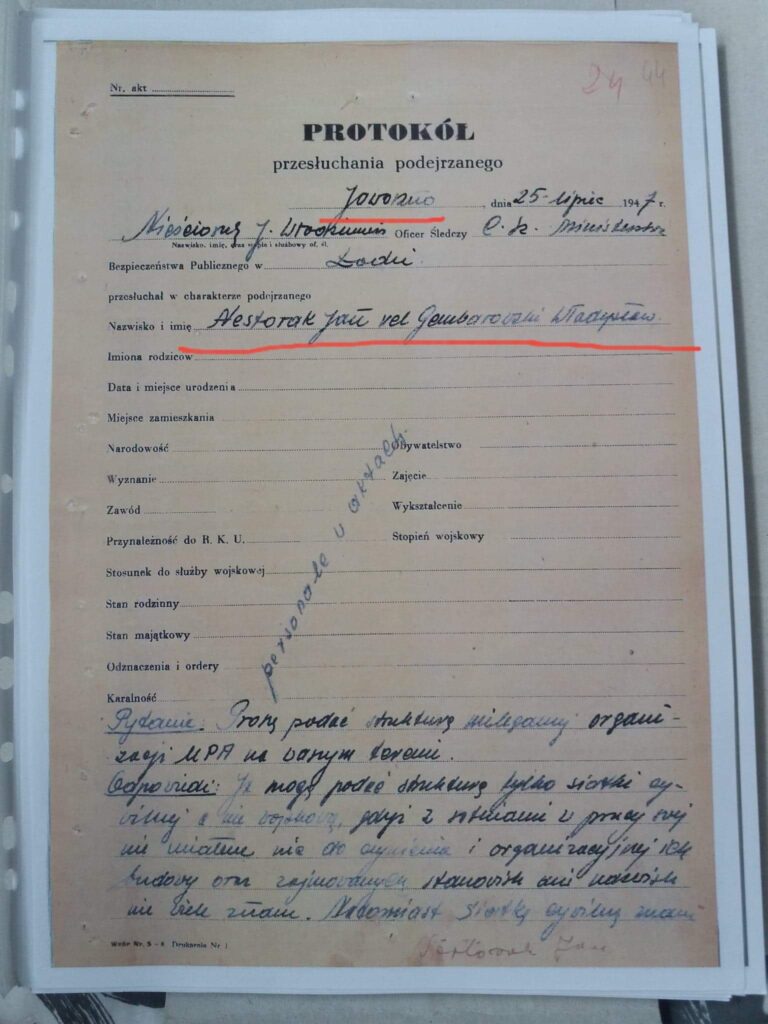
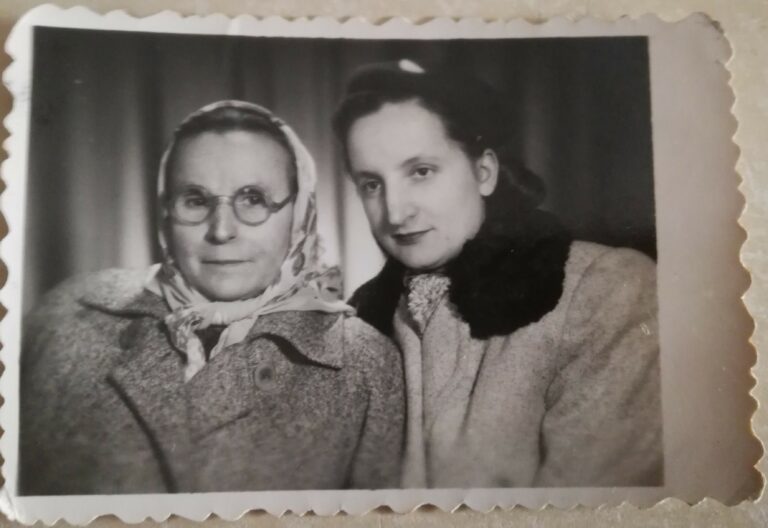
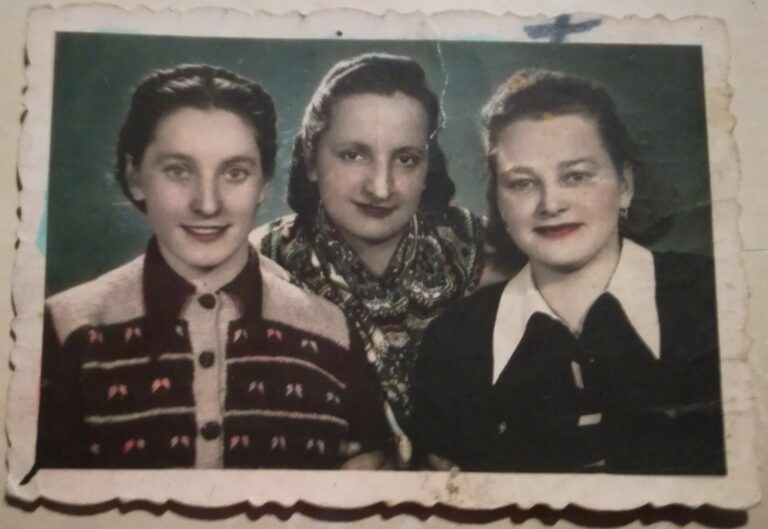
Vira Szot was a Ukrainian woman and UPA liaison. After World War II, she arrived in southern Poland, where she set up transfer points for UPA members trying to reach Western Europe. Her arrest came on June 7, 1947. She was imprisoned at Jaworzno, Mokotów, and Fordon. She received a death sentence that was commuted to fifteen years, perhaps because she agreed to collaborate. She was released in 1956. She stayed in Poland after her release and in the 1990s, after the fall of Communism, applied for rehabilitation.
In a letter from 1960 or 1961, which she called a confession and which is still in her IPN (Institute of National Remembrance) file, she blamed her difficult life on her former relationships with security officers. While emphasizing her commitment to the Ukrainian national movement, she complained that for years she was not able to obtain permission to visit her parents in the Soviet Union where they had been deported after her imprisonment. She ended the letter enigmatically, stating that her upbringing did not allow her to take her life, and, as a result, to continue living, she had to talk or write: “And today I cannot reconcile with the fact that I am supposed to be co-responsible for the secret police. For the murders committed on Ukraine. Neither my morality nor my upbringing allowed and it does not allow taking one’s life away. Too bad that the moon has not been discovered yet, I could escape there. Unfortunately, I had to live somewhere and to live I had to write … or blab (klepać językiem). That’s all.” (Letter from Vira Szot, 19 June year not clear, possibly 1961, p. 25, Szot’s file: 01236/760, BU IPN).
It is not clear what she meant by “writing” or “blabbing.” Did she mean “inform”? It certainly implies a need to share the stories of her life experiences. From her file, various facts emerge that cast a different light on Szot’s decision to inform and perhaps even point to her role as an informant. She went through a violent interrogation, which, as she later complained, made it impossible for her to have children. After her case was over, she was taken to Inowrocław, the harshest prison for the most voracious anti-Communists. The prison opinion about her in 1951 was that she remained negative toward Communist Poland. That perspective, however, appeared to change slightly, since toward the end of her prison term, in 1954, prison authorities emphasized her indifferent attitude toward the prison and her cellmates. She felt mistreated by prison authorities; she complained about having limited contact with her family and being unfairly labeled a “fascist,” a term that appeared in her prison sentence. Her reactions may seem confusing at first: she insisted on her innocence and empathized with anti-Communism, but at the same time, she acted like someone entitled to better treatment due to her service. Prison authorities in various prisons she was transferred to did not have any knowledge of her engagements with the security apparatus. Perhaps Szot began her cooperation with the secret police only to end it soon after and therefore was sent to Inowrocław. Perhaps, finally, her position in negotiations with MBP officers was affected by being a Ukrainian nationalist. Possible explanations remain in the realm of speculation. (Gorbaczewski, “Notatka ze spotkania z Wierą Szot,” 5 June 1961, Warsaw, p. 19, Szot’s file: 01236/760, BU IPN)
The uploaded document, from 1994, is a response to the court that issued a question regarding her past and potential rights as a war combatant. In the document, she explains the circumstances under which she was imprisoned. She claimed that she was never a UPA member but was just led to the border with the help of the UPA. She also describes her work for OUN, for example, her efforts to save some Ukrainian woman from being taken to Germany for forced labor.